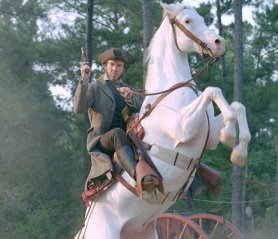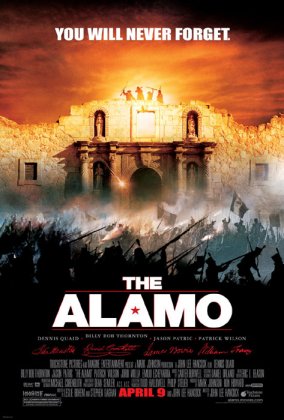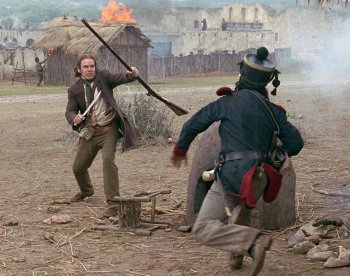|
The Alamo
By now,
the story of The Alamo has passed into legend, just the way
we like our American history. The heroes of that battle have
become larger than life, even as the actual details are fairly
vague. It even has a perfect sound bite.
The event
resonates in our culture, even though most people today probably
don't know what actually happened. Previous movies on the
subject reduced its complexity, Disney-fying it (literally,
with "The Ballad of Davey Crockett") just before the storybook
closes. But how long has it been since anyone has even seen
those?
With
his new take on the tale, co-writer/director John Lee Hancock
aims to change things. In a move sure to anger those who think
they remember The Alamo, he has recast the heroes as actual
human beings, and some not even good examples. The fortress
itself stands revealed as somewhat small and ill-suited for
a siege. Heck, characters even question why it's so important,
though nobody complains that it doesn't have a basement. But
evidently at one time in history, those who controlled The
Alamo controlled Texas.
When
he focuses on the small and the human, Hancock makes the legends
seem all the greater. But he has also placed them in the midst
of an unwieldy narrative that forces him into taking some
typical Hollywood shortcuts.
The result
is an uneasy mix of polemic and propaganda that sputters as
much as it soars. With Leslie Bohem and Stephen Gaghan, Hancock
has clearly done his homework on the script, throwing in a
lot of details that shed light on what drove the men on both
sides of the battle. But he has left almost too much in (this
is going to be a monster of a movie on DVD), making sure that
we understand as much as possible instead of focusing on the
narrative. Rather than edit for story, he seems to have simply
sliced for time, resulting in the fifth-billed actor, Marc
Blucas (Riley Finn on Buffy The Vampire Slayer), having
no actual lines or even an identity. At least he gets to look
grim a lot.
For those
who don't know how it ends, The Alamo does the courtesy
of actually opening with a pan over the slaughter of the brave
"Texians" before flashing back a year. This battle isn't just
about a singular example of American heroism. This is about
the birth of a nation. (Yep - they weren't necessarily fighting
for U.S. interests. Notice they keep talking about "The Republic
of Texas.")
 |
Trying
to midwife that nation was Sam Houston, played by real Texian
Dennis Quaid as a drunken but boisterous man with a dream.
Quaid turns that boisterousness into his patented scowl soon
enough as circumstances do inform against Houston. One day
Houston will be president of Texas, but for the duration of
The Alamo he is a drawling Machiavelli who keeps Tejano
captain Juan Seguin (Jordi Molla) from returning with more
men to The Alamo. Eventually his reasons come clear, and the
film makes the awkward point that sometimes war requires sacrifice,
and that sacrifice is made in lives. As long as you win, you
come out looking pretty good.
A lot
of the script works like that, throwing in dialogue that stumbles
to the right and left politically. From moment to moment,
it's hard to tell if the filmmakers think that the battle
was worth the cost, or indeed if any battle is. But then,
real war may just be that way until history has determined
the winners.
General
Santa Ana (Emilio Ecchevarria) has been judged harshly by
history. A self-styled "Napoleon of the West," the movie gives
him a few lines that almost add nobility to his cause. Or
would, if the movie also didn't also resort to making him
a two-dimensional lech and utter jerk who considers the soldiers
under his command as "nothing more than chickens." He means
poultry, not cowards.
One might
have hope for the portrayal of famed knife-fighter Jim Bowie
(Jason Patric). Beloved by his men, he might be an old-fashioned
fun drunk capable of greatness but for two things. For one,
Patric plays everything with deadly seriousness. And then
about an hour in, he coughs portentously into a handkerchief.
If you know movies, you know what that means. Sure enough,
there's blood, and you just know that Bowie will probably
die in the middle of the final musical number.
But Bowie
serves as a bridge to the real heart and soul of the film,
Davey Crockett (Billy Bob Thornton). When the film turns its
focus on Crockett, it comes alive, because Thornton himself
has a focus and a through-line. Sam Houston may be fighting
for Texas, but that's too big for an audience to grasp. Davey
Crockett, however, fights himself, and we're right there with
him.
If there's
a legacy of Jim Bowie, it's in the knife that bears his name,
but Crockett's legend started in his own lifetime, and it's
obvious that he fears it. In a sheepish confession to Bowie,
he avers that he only started wearing a raccoon skin cap because
a play about him said he did. He also has trouble convincing
a soldier who saw that play that it wasn't really him.
Of all
the figures of The Alamo, Crockett looms the largest, and
Hancock will probably get the most heat for this portrayal.
(Forget about The Passion
of the Christ stirring controversy; you do NOT want
to tell Texans that just maybe The Alamo didn't go down the
way they say it did.) When Crockett realizes that he has come
to The Alamo just in time for war, fear runs across his face.
But he also knows that everyone expects the legend - "if I
was just simple ol' David from Tennessee, I might drop over
that wall and take my chances," he says, "but that Davey Crockett
fellow, well, they're all watching him." And he does live
up to that legend.
It's
a powerful and moving role, and when Crockett's fate plays
out (again, not like Disney and John Wayne said it did), it's
even more affecting. Thornton lifts the movie into greatness
again and again. Unfortunately, it goes on for another twenty
minutes or so after he leaves it. Sure, Hancock has to cover
the Battle of San Jacinto, too, but by that time we have lost
the only character we truly came to care about.
Though
not the perfect work that Hancock and (ironically) Disney
hoped to achieve, The Alamo is fairly intelligent and
entertaining. For my money, it's even better that it will
surely provoke argument and discussion. Few enough movies
do that.
Rating: 
|








